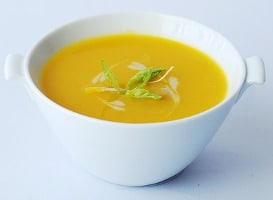“a little” and “a few” are determiners. We write them before a noun.
More specifically, they are quantifiers. They both describe a small quantity or amount of something.
“a few” describes a small quantity of a countable noun.
“a little” describes a small quantity of an uncountable noun.
Let’s look at each one in more detail.
“a few”
Form:
“a few” + countable noun in the plural form
Use:
to describe a small quantity of a countable noun.
Examples:
There are a few peas.

There are a few raspberries.
There are a few peaches.

“a little”
Form:
“a little” + uncountable noun
(Uncountable nouns are always in the singular form.)
Use:
to describe a small quantity of an uncountable noun.
There is a little pasta.
There is a little soup.
There is a little sugar.
What are countable and uncountable nouns?
See my lesson on countable and uncountable nouns for more information.
More English lessons
The difference between BEEN and GONE
English expressions of frequency
English nouns that only have a plural form
Transitive and intransitive verbs – English grammar
List of all our English lessons
English lessons on our Youtube channel


Ely Machuca says
Nice site to find a lot of explanation.